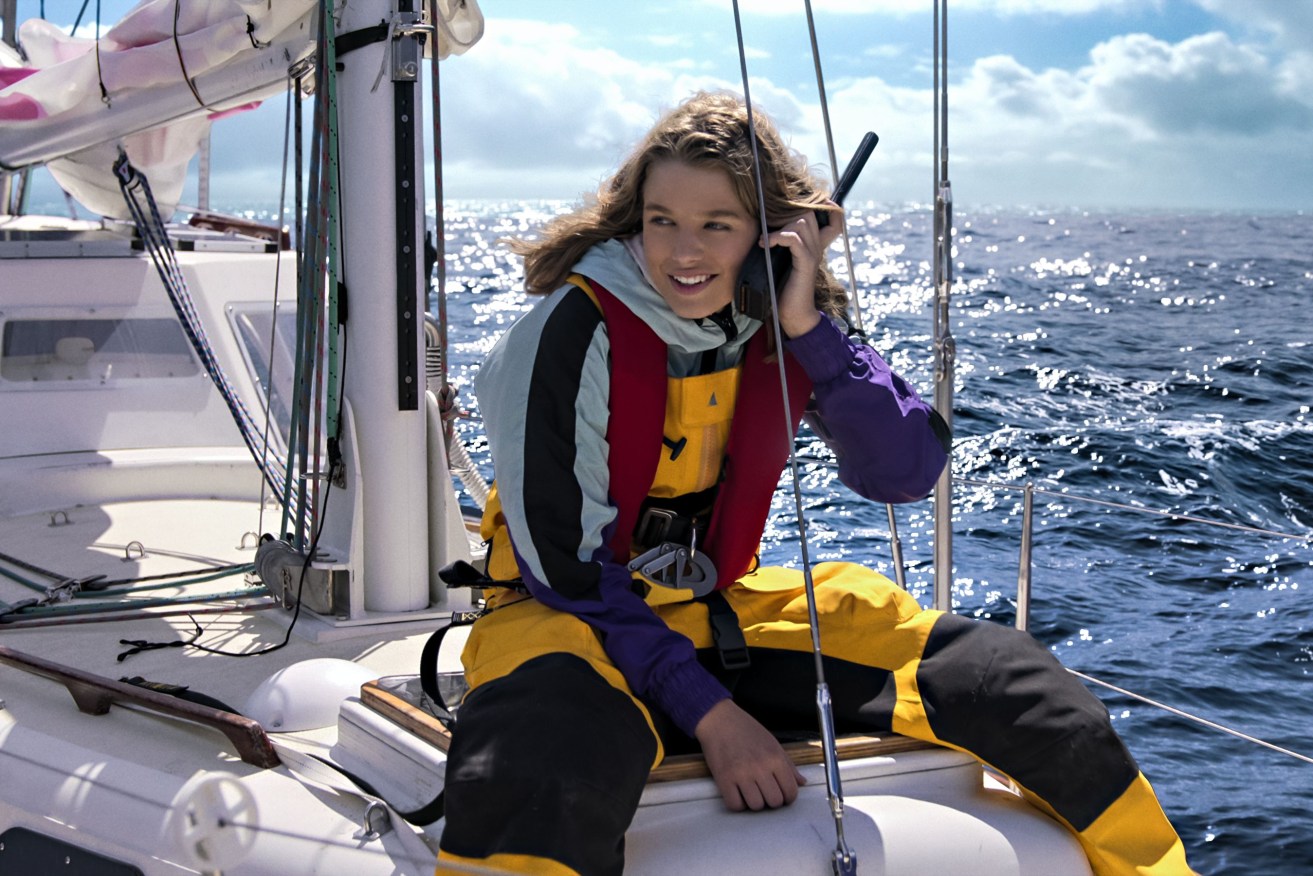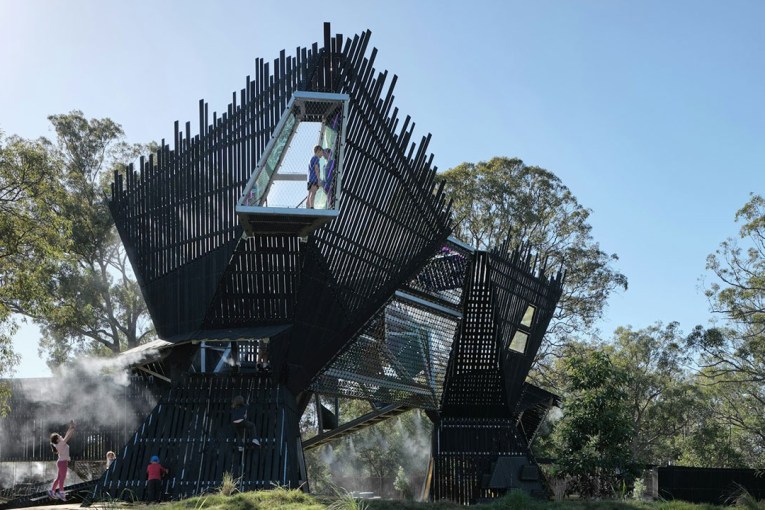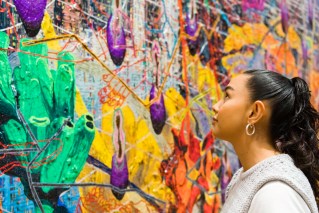Going solo: Jessica Watson’s journey for the ages finally makes it to the big screen
The long awaited bio-pic documenting the feats of Jessica Watson’s quest to become the youngest person to sail solo unassisted around the world is about to be realised – with a limited cinema release this week ahead of its worldwide release on Netflix on February 3.

Teagan Croft plays Jess Watson in the biopic True Spirit, filmed around South East Queensland. (Image supplied).
The film, True Spirit, was mostly shot in south-east Queensland, with Jessica Watson’s courageous feats navigating some of the world’s most challenging stretches of ocean tapping into a worldwide appeal that got Netflix on board.
Watson said it had taken many years of development with director Sarah Spillane and working closely with the star Teagan Croft, but she’s thrilled with the final results of how the movie has represented her life at that time, and her achievements.
“It’s weird because, it’s me, but it’s really not me as well,” Watson said.
“So it’s its own beautiful character and it’s its own beautiful thing, which I really, really love. It’s nice to have it as the story, but it’s also something else that Sarah and Tegan and everyone else involved has really brought to it, so I love that.
“Obviously Sarah and I have known each other for many years now and making me remember all the different kind of adventures we’ve got up to through the early drafts of the script – and then obviously when Teagan came on board, getting to spend a bit of time with her was fantastic as well.
“I don’t envy the task Teagan had, that’s for sure. But she’s done such an incredible job and I really love that she’s brought some of herself to it as well.”
Watson said when her boat Pink Lady is swept underwater by a gigantic wave in the movie with her tumbling around inside, is chilling for her to watch, taking her back to that moment.
“It’s a really long period of time the boat’s underwater for, and maybe it wasn’t quite that long in reality, but it’s true to the fact that time sort of stopped in that moment,” Watson said.
“So it is weird how that’s kind of really true. In reality, it was maybe not that long. It’s a little bit of movie magic, but they really captured that. It’s so true to how it was to the experience, so yeah, a little bit scary.”
Sarah Spillane paid tribute to Watson and the cast for overcoming challenges along the way to bringing the film to the big screen. She said Queensland’s Village Roadshow Studios provided the sophisticated technology needed to plunge the audience into the ocean alongside Watson on her travels around the world.
“When I was first approached to come on board it was a little bit intimidating, a story about a 16 year old girl alone at sea for 210 days is not a slam dunk in terms of how to adapt that as a film,” Spillane said.
“Most of the film was shot in Queensland on the Gold Coast and Village Roadshow Studios. We had about three days in Sydney to do some of the homecoming and departure scenes and that was it.
“But the wave sequences were challenging. To be honest, most of the story takes place on the water.
“We only shot a few days open ocean because most of the crew and our lead actress, Teagan Croft became very seasick.
“And so we had to shoot, which to be honest, I knew very early on when approaching these especially the rougher sea conditions, that we couldn’t do that open ocean anyway for safety reasons and technical reasons, and obviously seasick reasons.
“And so we had a number of sets and rigs and gimbals built, which was so much fun. One of them in particular reminded me of the old pirate ships in an amusement park kind of thing, like this replica of the pink lady up on a gimbal and rotating around.”
Spillane said part of her process of transforming Watson’s story and autobiography into the movie script was getting a glimpse of how absolutely truly alone Watson must have felt on her world record setting journey.
“The more time I spent with Jessica and realised how spiritual and philosophical and emotional the story was then it did become pretty obvious that this was something that I wanted to do and a story that’s really important to be told,” Spillane said.
“I think part of the writing process for me, I obviously spent a lot of time with Jessica, but then when I really sit down to write something, I try to create an environment that is as close to Jessica’s as possible in this case. I didn’t trust myself captaining a boat, so I did the next best thing, which is to rent a sort of random shack in the middle of the desert where there was no one else around and I didn’t see another person for weeks. And that’s where I got to somewhat replicate that sense of isolation.
“I connected very deeply with Jessica’s story from my own experience growing up as a tomboy in Australia. I had a dream that led me to a fairly male dominated field and I was often told no, whether it was me wanting to play football when I was young at a time that girls did not play football or rugby league, whether it was that or whether it was now pursuing a career in the film industry.”
The hurdles that Watson overcame with media opposition to her quest became a central part of the film, and how she overcame those challenges to her family as well as herself.
“There were so many roadblocks, and what I really connected to with this story, and Jessica as a person is that refusal to accept, no, you can’t do this,” Spillane said.
“In Jessica’s case, it was a lot of the Australian media there. There’s a public perception that would’ve been really difficult, I think, to overcome especially at that age.
“So I wanted to start when Jessica first had that the inspiration and that dream first became a reality for her in terms of, I’m going to work hard and I’m going to do this because I do think it’s symbolic for so many people. For Jessica, it was sailing. For other people, it’s an artistic pursuit or an athletic pursuit might be going to space. There are just so many parallels to this story that I hope people can resonate with.”
Watson said she hopes now more than a decade after her amazing feat that if another young woman wanted to do something like this, she wouldn’t have to face the same hurdles.
“It’s fantastic. I think increasingly, every time we go down to yacht clubs, it’s just there are more and more amazing female sailors,” Watson said.
“It really has and is changing. So that’s just fantastic. And I understand where a lot of the criticism was coming from. People were concerned, and that’s lovely – but let people have adventures and take these things on. It’s so important to live fully.”












